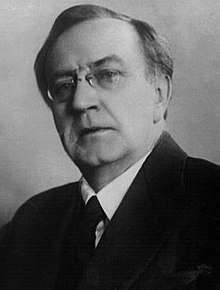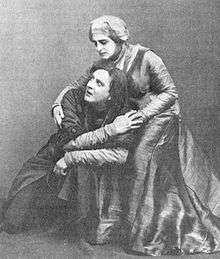Vasily Kachalov
Vasily Ivanovich Kachalov (Russian: Василий Иванович Качалов; 11 February [O.S. 30 January] 1875 – 30 September 1948), was one of Russia's most renowned actors. He worked closely and often with Konstantin Stanislavski. He led the so-called Kachalov Group within the Moscow Art Theatre. It was Kachalov who played Hamlet in the Symbolist production of 1911.

His father was Ivan Shverubovich, a Belarusian Orthodox priest from Vilnius. His schoolmates at the local college included Felix Dzerzhinsky and Konstantinas Galkauskas. In 1896, he left the law department of Saint Petersburg University in order to pursue an acting career. After four years of touring the Russian provinces and a brief stint at the Suvorin Theatre, Kachalov made his debut at the Moscow Art Theatre as Tsar Berendey in The Snow Maiden (spring 1900).
The snow maiden was played by Stanislavski's wife, Maria Lilina, who fell in love with Kachalov; she described their affair as "a touch of private happiness".[1] Another of his lovers was Alisa Koonen.[1] He met his wife, actress Nina Litovtseva, when they were acting in the Kazan Drama Theatre, one of Russia's oldest.
Kachalov was greatly admired for his "magnetic" voice. He played Baron Tuzenbach after Meyerhold's departure from the theatre. In the original 1904 production of The Cherry Orchard he appeared as Trofimov. He starred in Nemirovich-Danchenko's production of Ivanov later that year. All in all, he took more than 50 roles in Stanislavski's company.
After the Russian Revolution, the Kachalov Group went touring Central Europe and did not return until the summer of 1921, under pressure from the theatre's founders.[2]
Kachalov was named one of the first People's Artists of the USSR after the title was instituted in 1936 and received a Stalin Prize in 1943. He was also the recipient of the two Orders of Lenin. The Kazan State Theatre was given his name in 1948.
The Russian director and puppeteer, Sergey Obraztsov, described seeing Kachalov on stage:
“That matchless voice of his sounded different each time. Different too was that amazing process of creating a phrase, and every visual image evoked by the word. One had the impression that Kachalov was not merely speaking but thinking aloud, and that the words one heard were only a part of what he was seeing with his inner eye. For that reason people did not merely listen to Kachalov, they watched what he was talking about.”[3]

Notable performances
- 1900 - Snow Maiden by Alexander Ostrovsky, directed by Stanislavsky
- 1900 - When We Dead Awaken by Ibsen, directed by Nemirovich-Danchenko
- 1900 - The Death of Ivan the Terrible, Tolstoy, dir. by Stanislavsky and Nemirovich-Danchenko
- 1901 - Three Sisters by Anton Chekhov, directed by Stanislavski, role: Vershinin
- 1901 - The Wild Duck by Ibsen. Role: Ekdal
- 1901 - The Seagull by Anton Chekhov, directed by Stanislavsky, role: Trigorin
- 1902 - The Death of Ivan the Terrible by A. Tolstoy
- 1902 - Three Sisters, Anton Chekhov. Role: Tuzenbach
- 1902 - The Lower Depths, Gorky. Role: Baron
- 1903 - The Pillars of Society, Ibsen. Role Hilmar
- 1903 - Julius Caesar, Shakespeare. Role: Julius Caesar
- 1904 - The Cherry Orchard, Chekhov. Role: Trofimov
- 1904 - Ivanov, Chekhov. Role: Ivanov
- 1905 - Ghosts, Ibsen. Role: Pastor Manders
- 1906 - Brand, Ibsen. Role: Brand
- 1907 - Boris Godunov, by Pushkin
- 1908 - Rosmersholm, Ibsen. Role: Rosmer
- 1910 - The Brothers Karamazov, by Dostoevsky. Role: Ivan Karamazov
- 1910 - A Month in the Country, Turgenev. Role: Rakitin
- 1911 - Hamlet, Shakespeare, directed by Gordon Craig. Role: Hamlet
- 1918 - Uncle Vanya, by Anton Chekhov. Role: Astroff
- 1935 - Enemies, Gorky. Role: Bardin
References
- Maria Ignatieva. Stanislavsky and female actors: women in Stanislavsky's life and art. University Press of America, 2008. ISBN 9780761841791. Page 39.
- A History of Russian Theatre (eds. Robert Leach, Victor Borovsky). Cambridge University Press, 1999. Page 273.
- Obraztsov, Sergei. My Profession. The Minerva Group, Inc. (2001) ISBN 9781589634565 p. 215